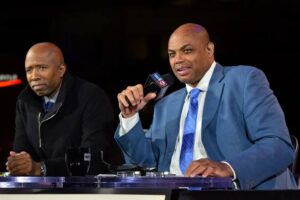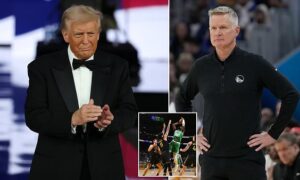
May 16, 2016; Indianapolis, IN, USA; Indiana Pacers president of basketball operations Larry Bird speak to the press during a press conference at Bankers Life Fieldhouse. Mandatory Credit: Trevor Ruszkowski-USA TODAY Sports
Elite Story: professional basketball legend” Larry Bird has finally made an unclear statement based on his comments on white supporters after many years” report.
Larry Bird, a legendary figure in the history of basketball, was known not only for his exceptional skills on the court but also for his strong opinions and competitive spirit. One of the lesser-known aspects of Bird’s career is his aversion to being defended by white players, particularly when it was perceived as a strategic move by opposing coaches.
Throughout his career, Larry Bird faced numerous challenges and adversities, both on and off the court. As a white player in a predominantly African American league, Bird was often seen as an anomaly. His success and dominance in the NBA during the 1980s solidified his place as one of the greatest players of all time, but it also brought with it unique pressures and expectations.
Bird’s dislike for being defended by white players stemmed from a combination of factors. Firstly, he believed that it undermined his abilities and skills as a basketball player. Bird prided himself on being able to excel against any opponent, regardless of their race or background. Being guarded by white players was, in his view, a sign that opposing coaches did not respect his talent enough to match him up against their best defenders, irrespective of race.
Secondly, Bird was acutely aware of the racial dynamics at play in the sport. Basketball has historically been a sport dominated by African American athletes, and Bird’s presence as a white superstar was a rarity. He was keenly attuned to issues of race and representation, both within the league and in broader society. Being defended by white players sometimes felt like a deliberate attempt to diminish his impact or to downplay the significance of his achievements.
Moreover, Bird’s preference to face tougher defensive challenges from African American players was a reflection of his competitive nature. He thrived on competition and enjoyed the mental and physical challenges that came with facing the best defenders in the league. For Bird, the color of his opponent’s skin should not have mattered – what mattered most was the skill and intensity they brought to the game.
It’s important to note that Bird’s feelings on this matter were not widely publicized during his playing career. He was known for being a reserved and private individual off the court, preferring to let his performance on the hardwood speak for itself. However, his competitive fire and strong opinions were well-known among his teammates, coaches, and opponents.
Throughout his career, Larry Bird faced many challenges and obstacles, both on and off the court. His aversion to being defended by white players was a reflection of his competitive spirit, his desire to be challenged by the best defenders in the league, and his sensitivity to issues of race and representation in basketball.
Larry Bird’s dislike for being defended by white players was rooted in his competitive nature, his desire to be respected for his abilities as a basketball player, and his awareness of the racial dynamics within the sport. While this aspect of his career may not be as well-known as his accomplishments on the court, it sheds light on the complexities of race, identity, and competition in professional sports.







